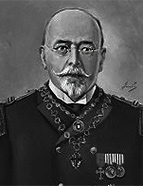

In 1885, Vicente Almeida d'Eça submitted a dissertation entitled Do Exercício da Pesca Marítima [On the Exercise of Maritime Fishing] as a candidate for the Escola Naval. It was a study on the "exercise of maritime fishing under international law". One of his conclusions was that fishing was "an immediate consequence of man's ability to make use of the sea." From this perspective, a state's maritime actions were exercised in many ways and needed to be contextualised within the history of humanity's use of the sea, which emerged as the main theme of Maritime History.
Influenced by Anglo-Saxon maritime and naval historiography, where concepts and chronology were determined by Admiral Alfred T. Mahan (1840-1914), author of The Influence of Sea Power upon History 1660-1783 (1890), Almeida d'Eça believed that Maritime History was not merely a succession of naval wars, nor a narrative about these conflicts. However, analysing these confrontations at sea from the perspectives of tactics, strategy, and naval art was of interest. Such wars, he argued, would ultimately be the result of a state's foreign and maritime policy. In 1885, Almeida d'Eça published a literary work, Contos sem Cor [Tales without Colour], which undoubtedly reflects his youthful experiences on the long sea voyages he undertook to various parts of the world.
He also served as the director of the Biblioteca da Escola Naval [Naval School Library] from 1885 to 1888. Additionally, he was a member of numerous commissions, including one responsible for proposing the subjects of the theoretical course for masters at each of the Navy Arsenal's workshops (1887) and another that presented a project to reorganise the Navy's personnel and logistical services (1887). His participation in these commissions resulted in the publication of technical studies that are important sources for the study of teaching and the organisation of services within the Portuguese Navy, including A Organização da Marinha de Guerra e as Últimas Reformas [The Organization of the Navy and the Latest Reforms] (1890) and Nota sobre os Estabelecimentos de Instrução Naval em Portugal, principalmente sobre a Escola Naval [Note on the Naval Training Establishments in Portugal, Mainly on the Naval School] (1892). The publication of these texts should be considered alongside his contributions to the Anais do Clube Militar Naval [Annals of the Naval Military Club], where he published over three dozen articles on topics relevant at the time, including warships, armaments, conscription, naval education, and maritime law. His early studies critiqued the use of the so-called regressive method, which was prevalent at the end of the 19th century. In fact, it appears that Almeida d'Eça was interested in the study of naval and maritime history from a very young age, initially summarising contemporary events before moving backwards to more distant times, in order to reconstruct history based on familiar realities.
